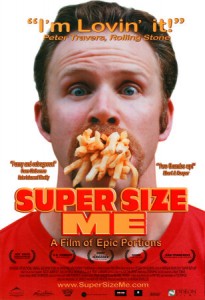Most people talk about subject other than bin Laden while in bed. Not Mr. and Mrs. Rumsfeld.
If you’re a cheese artist, what’s next? Making a bed of ham.
Make your own Bush/Cheney uncampaign sloganator sign.

Mortie, Mortie: He's no shorty, Mortie.
Most people talk about subject other than bin Laden while in bed. Not Mr. and Mrs. Rumsfeld.
If you’re a cheese artist, what’s next? Making a bed of ham.
Make your own Bush/Cheney uncampaign sloganator sign.
I remember seeing this vigil across the street from the White House on a couple of visits to Washington, DC, but I had no idea that this vigil has gone on since June 3, 1981.
Here’s a cool look at the future as seen from people from the past.
Look out, Grandma Millie. Enron is taking advantage of you.
 This weekend, I saw Morgan Spurlock’s “Super Size Me”. The up-and-coming filmmaker has been compared to Michael Moore, but offers a more urban point of view. It’s not a film for the faint of stomach — at one point, there’s a stomach-stapling surgery procedure, and many collages of overweight Americans, mostly from Texas (where 5 of the top 10 overweight cities in the U.S. reside). The film, according to today’s Wall Street Journal, has grossed about $4.3 million, far behind the weekend takes of both Shrek 2 ($92.2m) and The Day After Tomorrow ($86.6m), but a great start for a documentary. The buzz generated from the film has allowed it national exposure, and Spurlock has handled himself well on camera, defending critics of the film (fast food restaurants and associations, of course) and presenting lucid arguments (his 30-day McDonald’s diet, at 5,100 calories a day, is actually quite normal for a sizeable portion of our population — consider the Egg McMuffin for breakfast, Wendy’s for lunch, and a Pizza for dinner).
This weekend, I saw Morgan Spurlock’s “Super Size Me”. The up-and-coming filmmaker has been compared to Michael Moore, but offers a more urban point of view. It’s not a film for the faint of stomach — at one point, there’s a stomach-stapling surgery procedure, and many collages of overweight Americans, mostly from Texas (where 5 of the top 10 overweight cities in the U.S. reside). The film, according to today’s Wall Street Journal, has grossed about $4.3 million, far behind the weekend takes of both Shrek 2 ($92.2m) and The Day After Tomorrow ($86.6m), but a great start for a documentary. The buzz generated from the film has allowed it national exposure, and Spurlock has handled himself well on camera, defending critics of the film (fast food restaurants and associations, of course) and presenting lucid arguments (his 30-day McDonald’s diet, at 5,100 calories a day, is actually quite normal for a sizeable portion of our population — consider the Egg McMuffin for breakfast, Wendy’s for lunch, and a Pizza for dinner).
As I’m watching the film, I’m wondering how many people in the room are part of the audience Spurlock was refers to. I’m in Seattle, a quite health-conscious city, and when the lights go up at the end of the film, I see two people in the theatre with super-sized frames holding super-sized beverages, and I begin to wonder if I would start judging people with that physique for making poor personal diet choices or being the victims of an onslaught of advertising and marketing they’ve experienced since childhood.
On childhood, a segment of the film talks about the current state of the US school lunch program. I was in high school during the late 80s, and while we had institutional pizza, fries, cheeseburgers and other partially-hydrogenated vegetable oil delicacies, there was also an option for a salad bar, where, if you didn’t submerge the lettuce with dressing, there was a chance you’d leave the grounds with some nutritional value. When the state insitutionalizes these high-salt, high-fat products (engrained extensively through school and fast food chain partnerships), they’re giving students the idea that these foods are (part of) a healthy diet, and one can’t help but think of the connection between the Standard American Diet (SAD) and the explosion in diabetes- and heart-related illnesses.
I can’t be one to judge, though. I have a weakness for Taco Bell once in a great while, usually preceded by a few beers earlier in the evening. The 7-layer burrito, bean burrito and an order of mexi-nuggets (read: tater tots with spices) have kept me from a headache the next day.
In addition to reading “Diet for a New America” by John Robbins, and other media of the genre, I leave “Super Size Me” profoundly aware of the damage these foods offer America, and I think about the marketing of foods, the graphics, the excessive packaging, the marketing towards children, and wonder why Congress hasn’t classified these foods as Weapons of Mass Destruction, since food-related illness is the second leading cause of death (right behind smoking) in America.
But I know there’s hope. The organic food industry is experiencing exponential growth (given officlal recognition by the USDA’s Organic food labeling system), and organic, healthy products appear in mainstream grocery stores (only an aisle or two per store, but it’s a start). Non-profits, like the Organic Consumers Association are making sure government holds steady to organic standards (with a recent victory preventing the watering down of these standards) and going after major offenders like Monsanto (a good start for charter revocation, and that wisely decided not to commercialize a genetically-modified wheat, due to lack of demand, trust in the product, and export worries).
There’s still a long way to go. The USDA will need to stand up to the food lobbies and present dietary guidelines that matter. School boards need to allow alternatives to existing school lunch programs, and receive funding for these options (a minimal price difference). Congress will need to toughen guidelines for advertising fast and processed foods (similar to the Surgeon General’s warning for cigarettes, with the addition of banning ads during child-specific television programs). Of course, personal responsibility plays a strong role, too. Most of us know that these foods are bad for us, but we eat them anyway. As tobacco lawsuits were for the 90s, this decade promises to be the way we feed our children.
A duckumentary? No, an exhibit of ducks. “Duckumented” in German.
“I have been in this business a long time and I have seen many staggering things, but this one is over the line. Now I am really ashamed to carry an American passport.”
– Hunter Thompson, on the Abu Grahaib photographs
I’m thinking a Howard Dean supporter created this semi-unfortunate John Kerry website.
An excellent article on how the Left can build an effective countermovement. Hint: it’s all about the marketing.
I always suspected that the Atkins diet wasn’t the best solution to dieting (eat less, eat healthy and exercise more), and question why the media is railing against this individual suing Atkins for his high cholesterol and surgery required to unblock his arteries, I hope he succeeds… there’s one glaring weakness in his case, though — he was on the diet for two years, and I can’t imagine a diet high in protein and low in carbs is good for anyone for that period of time, much like the attempted performance art experiment in Super Size Me.
Wal-Mart wanted two of their superstores in Chicago. They got one, providing low-wage, non-union jobs in the inner city, and likely threatening unionized labor at surrounding stores.
If there wasn’t a wedding going on that was bombed by US planes, then why the video footage?
Michael Moore wins the Palme d’Or for Fahrenheit 9/11, and won on merit, says Quentin Tarantino.
Eric Idle sings about the FCC and the Bush administration.
Found in a UK newspaper: the US Supreme Court rules that cars near a crime can be searched without the owner present.
Why on Earth did Wal-Mart receive $1 billion in government subsidies?
My favorite character from Law and Order, Jerry Orbach’s (who looks suspiciously like someone from our family) Lennie Briscoe, retired from the show after 11 years. Dennis Farina will be his replacement for next season.
Percy Schmeiser, a Canadian farmer, lost his Supreme Court battle with Monsanto. Monsanto’s genetically-engineered seeds blew onto his property from a neighboring farm, and the agribusiness giant sued him for patent infringement.
SBC fights outsourcing and settles strike dispute — maybe they can provide California residents with reasonably-priced phone service.
80 British students broke the world’s record for nude rollercoastering. Strangely tied into comfort with the global warming issue, Vladimir Putin expressed that Russia is leaning towards signing the Kyoto Protocol.
Tony Randall, my inspiration for cleanliness from his Felix Unger character on the Odd Couple, left this world.
Avoid the lines into the nightclub — get an embedded chip (just like the way we chip cats and dogs) that deducts the cover from your credit card.
A rare cello avoids becoming a CD rack.
You live in Florida, and your garage door can’t open. It’s probably the $5.5 million the United States Air Force spent to jam the frequency.
Fed up with paperwork, some physicians are starting cash-only practices.
Are Americans entitled to cheap gas? No, says the rest of the planet. And neither are they entitled to good television programming this fall.